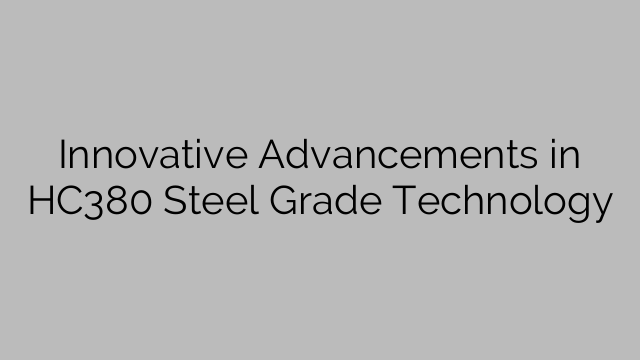The steel industry has seen a rapid evolution in recent years, with advanced technologies playing a pivotal role in the development of high-quality steel grades. One such example is the HC380 steel grade, which has seen innovative advancements to improve its performance and durability.
HC380 steel grade is a high-strength, low-alloy steel that is widely used in the manufacturing of structural components, such as beams and columns, as well as in the production of heavy machinery and equipment. This steel grade is known for its excellent weldability, formability, and resistance to corrosion, making it a preferred choice for a wide range of industrial applications.
In recent years, there have been significant advancements in the technology used to produce HC380 steel grade, leading to improvements in its mechanical properties and overall performance. One of the key innovations in this regard is the development of advanced heat treatment processes, which have enabled the production of steel with higher tensile strength and improved toughness.
The use of advanced alloying elements, such as manganese, chromium, and molybdenum, has also contributed to the enhancement of HC380 steel grade. These alloys help to improve the steel’s strength, hardness, and resistance to wear and tear, making it suitable for use in demanding environments and under extreme conditions.
Furthermore, advancements in the processing techniques used to manufacture HC380 steel grade have led to greater control over the microstructure of the steel, resulting in improved homogeneity and consistency in its properties. This has not only enhanced the steel’s mechanical performance but has also made it more predictable and reliable in its behavior.
Another area of innovation in HC380 steel grade technology is the development of environmentally friendly production processes. This includes the adoption of sustainable practices in steel manufacturing, such as the use of renewable energy sources, recycling of steel scrap, and reducing the emission of pollutants. These advancements have helped to improve the overall sustainability of HC380 steel production, making it a more environmentally friendly option for various applications.
The innovative advancements in HC380 steel grade technology have opened up new possibilities for its use in a wide range of industries. From construction and infrastructure to automotive and heavy machinery manufacturing, the improved performance and durability of HC380 steel grade are enabling the development of safer, more efficient, and more sustainable products and infrastructure.
As the steel industry continues to evolve and embrace new technologies, it is likely that we will see further advancements in the HC380 steel grade, leading to even greater performance and versatility. With ongoing research and development efforts, the future of HC380 steel grade holds great promise for the creation of advanced materials that will continue to drive innovation and progress across various industrial sectors.

